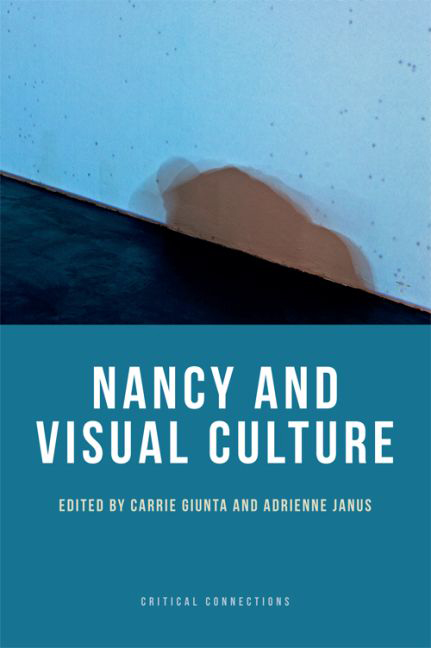Book contents
- Frontmatter
- Contents
- List of illustrations
- Acknowledgements
- Introduction: Jean-Luc Nancy and the Image of Visual Culture
- 1 Cutting and Letting-Be
- 2 Dancing Equality: Image, Imitation and Participation
- 3 A Question of Listening: Nancean Resonance, Return and Relation in Charlie Chaplin
- 4 The Image: Mimesis and Methexis
- 5 On the Threshold: Visual Culture, Invisible Nature
- 6 Pornosophy: Jean-Luc Nancy and the Pornographic Image
- 7 Presentation and Disappearance: Dialogue between Soun-Gui Kim and Jean-Luc Nancy
- 8 Writing in the Place of the Animal
- 9 Together at the Limit: Jean-Luc Nancy, Art and Community
- 10 Turning Around the Written Mark, Opening from a Weight of Thought
- 11 Uncanny Landscapes of Photography: The Partage of Double-Exposure after Jean-Luc Nancy
- Contributors
- Bibliography
- Index
8 - Writing in the Place of the Animal
Published online by Cambridge University Press: 15 September 2017
- Frontmatter
- Contents
- List of illustrations
- Acknowledgements
- Introduction: Jean-Luc Nancy and the Image of Visual Culture
- 1 Cutting and Letting-Be
- 2 Dancing Equality: Image, Imitation and Participation
- 3 A Question of Listening: Nancean Resonance, Return and Relation in Charlie Chaplin
- 4 The Image: Mimesis and Methexis
- 5 On the Threshold: Visual Culture, Invisible Nature
- 6 Pornosophy: Jean-Luc Nancy and the Pornographic Image
- 7 Presentation and Disappearance: Dialogue between Soun-Gui Kim and Jean-Luc Nancy
- 8 Writing in the Place of the Animal
- 9 Together at the Limit: Jean-Luc Nancy, Art and Community
- 10 Turning Around the Written Mark, Opening from a Weight of Thought
- 11 Uncanny Landscapes of Photography: The Partage of Double-Exposure after Jean-Luc Nancy
- Contributors
- Bibliography
- Index
Summary
Outlandish are the bodies: they are made of the outside, of the extraneitas that forms the outsider's outsidiness. The outside always seems to come after the inside, like a medium, an element in which the inside world pre-exists, detached, closed onto itself. But this enclosing, this enfolding inside can only take place through the detachment unfolding the outside.
Mourning the loss of the animal body, having colonised their world, our savagery was met with reticence, silence from our partners in form who showed up, remained and faded. The finitude of annihilation leaves us now searching for authors accounting for the place of the animal, waiting on those who can enliven speech, lending voice and character, prompts for re-animating lost species. This is radiated animality, witnessed in cinema's projected electric world and encountered in the aqua-vivarium's scrutiny of specimens. Jean-Luc Nancy's notion of bodily secrecy, dissected decompositions ‘deployed in world secret’, are accordingly rewritten as newly composed collaborations in bodily form, textual revelations on how creation causes embodiment according to variants brimming with combinations on originary code. These ex nihilo creations are bristling with sudden momentum, möbius ribbon linking a ‘spasm of the nihil’ to the ‘spec with no dimensions’. The genesis of nothing pre-empts the growth of an armature, an enclosure for an otherwise eternally disembodied spirit. In turn, this exudes exotic ramifications spawning bewildering, endless displays of potential form, species variation and crossspecies mutation.
If writing in the place of the animal includes first contact with the other side, this chapter seeks a negotiating position whereby robust creaturely conveyances are also sought, extending gestures of generative co-proposition, gazes returned. The terms of such engagement do not require a priori knowledge, privileging an emergent framework for operations without need of any shared intentionality, a human-animal and animal-animal accord advancing a perceptual, semio-spheric endgame where residues still meet, each organism co-signing a contract, humanity seeking a form of closure.
To explore reciprocity, avoiding traps of complacency, let's take an initial look at matters where transmissions, flow and exchange between species ended their worldly co-occupancy. Firstly in the heinous, unfortunate direction of the laboratory or abattoir, the former a sectioned bio-medical space where creatures, held under scrutiny, are withdrawn and objectified, kept in mortifying conditions.
- Type
- Chapter
- Information
- Nancy and Visual Culture , pp. 144 - 163Publisher: Edinburgh University PressPrint publication year: 2016



